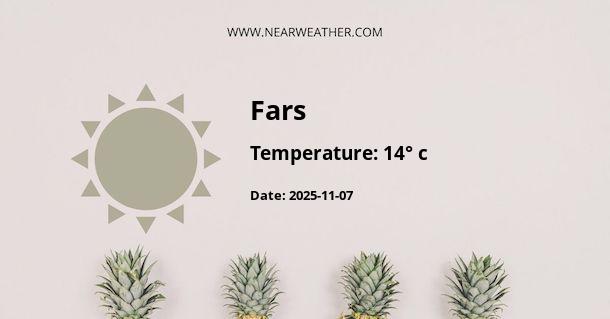Overview of Ostān-e Fārs, IR
Ostān-e Fārs, more commonly known as Fars Province, is one of the thirty-one provinces of Iran. Known for its rich history and diverse culture, Fars is also recognized for its distinct climate and weather patterns.
Geographical Location
Fars Province is situated in the south of Iran and is surrounded by the Persian Gulf and the Gulf of Oman to its south. The province is known for its diverse landscapes, which range from rugged mountain ranges to vast desert plains, which significantly contribute to its varied climate.
Climate of Ostān-e Fārs
The climate in Fars Province is primarily classified as a desert and semi-desert climate, with some regions experiencing a Mediterranean climate. This variation in climate is primarily due to the province's diverse topography and its location within the subtropical aridity of the Arabian Desert belt.
"The climate in Fars Province is primarily classified as a desert and semi-desert climate, with some regions experiencing a Mediterranean climate."
Weather Year-Round
The weather in Fars Province varies significantly throughout the year. Here is a breakdown of the weather patterns throughout the year:
- Winter (December to February): Winters are usually cool and wet, especially in the mountainous regions. The temperatures can drop below freezing, especially at night. Snowfall is common in the higher altitudes.
- Spring (March to May): Spring is characterized by mild and pleasant weather. The temperatures typically range between 15°C to 25°C. This is also the period when the desert regions experience their most rainfall.
- Summer (June to August): Summers are extremely hot and dry. The temperatures can soar above 40°C in the desert regions, while the coastal areas experience slightly cooler temperatures due to the influence of the Persian Gulf.
- Autumn (September to November): Autumn is similar to spring with mild and pleasant weather. The temperatures average around 20°C to 30°C.
Annual Rainfall
The annual rainfall in Fars Province varies significantly based on the region. The coastal areas and the mountainous regions receive more rainfall compared to the desert regions. The average annual rainfall is approximately 330 mm, but it can be as low as 200 mm in the desert regions and as high as 500 mm in the mountainous regions.
Conclusion
In conclusion, Fars Province boasts a diverse climate due to its varied topography. From the hot and arid desert regions to the cool and wet mountainous areas, the province offers a unique blend of weather patterns, making it an intriguing destination for climate enthusiasts.
"From the hot and arid desert regions to the cool and wet mountainous areas, Fars Province offers a unique blend of weather patterns."
A - Fars's Latitude is 29.000000 & Longitude is 53.000000.
A - Weather in Fars is 15° today.
A - Climate Conditions in Fars shows few clouds today.
A - Humidity in Fars is 41% today.
A - Wind speed in Fars is 13.18 km/h, flowing at 301° wind direction. today.
